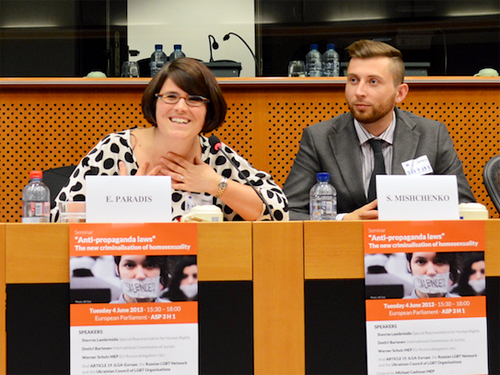LGBT Intergroup of the European Parliament: What is the consequence of “anti-propaganda laws”
In the beginning of June 2013 LGBT Intergroup of the European Parliament held a meeting in Brussels to discuss the worrying trend of “anti-propaganda laws” in some European countries. It was mainly about the situation in Russia and Ukraine, since the topic most relevant precisely to these states. Several experts and policy-makers took the floor, including those from the states where gay people either already have been, or may be victims of these laws that will affect their lives, and not only from the legal perspective.
Among them was also Stanislav Mishchenko, the member of ”Gay-Alliance Ukraine”, who came to Brussels as a representative of All-Ukrainian Union “Council of LGBT organizations in Ukraine”.
“An already very bad situation was made worse by these laws”, – underlined Stanislav Mishchenko. He also mentioned that Ukrainian phony draft of anti-discrimination laws are in fact a kind of fake to blur one’s eyes and that in reality they are not able effectively protect LGBT people from discrimination. Mr Mishchenko reminded that there is the far-right party Svoboda in Verkhovna Rada of Ukraine that is very active in its attempts to limit LGBT people’s rights. Mr Mishchenko also stressed that the threat of stopping EU visa liberalization negotiations had worked so far, but that it was also very important to provide other positive incentives occasionally.

Dmitri Bartenev from the International Commission of Jurists, Russian human rights lawyer, gave a legal overview of the situation in Russia. The International Commission of Jurists – non-governmental organization working in the sphere of human rights and international standards of justice system. 60 eminent jurists (judges and lawyers) from all around the world take part in this work. Mr Bartenev pointed to the fact that legal definitions were usually poorly worded and vague. Andrew Smith from an independent human rights organization ”ARTICLE 19”, which is aimed to protect and support the right of freedom of speech and expression around the world, reported that from a legal point of view, freedom of expression includes the right to express one’s sexual orientation or gender identity, and to receive and impart information about them freely. This right cannot be restricted based on the majority’s prejudices, explained Mr Smith. He also continued to explain that the “anti-propaganda laws” shouldn’t impact the other human rights, such as the right to freedom of assembly during LGBT pride events etc.
“ARTICLE 19” – the organization named after Article 19 of The Universal Declaration of Human Rights that guarantees the right to freedom of expression, – recommended that the EU lead by example and promote the rights of LGBT people, and keep threatening legal sanctions against other countries.
Evelyne Paradis, a representative of the European Region of the International Lesbian, Gay, Bisexual, Trans and Intersex Association ILGA-Europe, indicated that the significance of these laws and the term of “propaganda” vary from one country to the next. Besides, there is also a difference between individuals and organisations, the latter receiving such hefty fines that they would be, or are already forced to close. ILGA-Europe insists that any argument concerning children’s rights doesn’t stand and this is important to keep in mind: the UN Committee on the Rights of the Child, including decisions and recommendations from over ten years ago, clearly says there is a need and a right for LGBT young people to have access to information on their sexuality.

Therefore on one occasion, the Russian Federal Supreme Court found that “homosexual propaganda” meant the direct promotion of same-sex relations. At the same time the Court emphasized that “propaganda” did not include simply discussing sexuality, including homosexuality, nor public assemblies such as LGBT prides.
Anastasia Smirnova, representing Russian LGBT Network, explained that the laws enacted in ten Russian regions so far (and in discussion at the federal level) had meant that some of the Russian LGBT Network‘s activities were already forbidden, even though there was no legal violation. The law also meant that some NGOs could not perform or even be registered in some regions, to work with homosexual – the victim of physical assault – to provide legal assistance. All their information materials, including leaflets and website, had to be marked “18+”.
Herewith application of the new laws is unclear even for lawyers: so far no organization was charged with “homosexual propaganda”. In addition to the law itself, there are now very organized and targeted actions by homophobic groups, informally authorized or encouraged by the police. The “foreign agents” law further complicates NGOs’ work, notably through increased administrative burdens, and administrative checks making their work impossible.
Up to date in Russia the St. Petersburg LGBT organization “Coming Out” was recognized as the “foreign agent”. The court held to collect 500,000 RUB (about 123 240 UAH) from the organization. At the same time the head of the organization, Anna Anisimova was obliged by the court to pay a fine in the amount of 300,000 RUB (about 73,944 UAH). And the LGBT film festival “Side by Side” was obliged to pay a fine of the same 500 thousand RUB.
Concluding the event, EU Special Representative for Human Rights Stavros Lambrinidis stressed that taken together with the new “foreign agents” law, the point of those laws is clearly to create an atmosphere of intimidation and censorship. And judging by what is happening in Russia and partly in Ukraine, it is already the atmosphere LGBT citizens of these countries are living in.
Автор: European Parliament Intergroup on LGBT Rights

